OpenFaces is an open-source library of AJAX-powered JSF components, an Ajax framework and a client-side validation framework. OpenFaces is based on the set of JSF components formerly known as QuipuKit. It contains fully revised codebase of QuipuKit and introduces many new components and features.
Here’s a list of components inherited from the QuipuKit library: Calendar, Chart, Confirmation, DataTable, DateChooser, DynamicImage, FoldingPanel, GraphicText, HintLabel, PopupLayer, SuggestionField, TabSet, TabbedPane, TreeTable, TwoListSelection, Utility Components (Focus, ScrollPosition, LoadBundle).
OpenFaces is distributed under a dual license model. It means that you can choose between using the library under GNU Lesser General Public License (LGPL) or purchasing a commercial license.
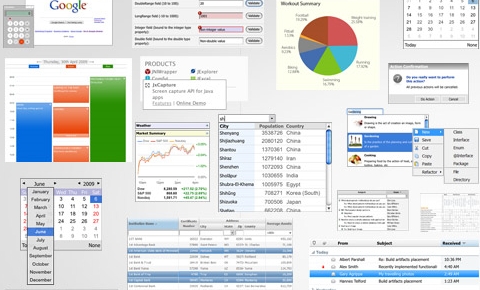
Requirements: –
Demo: http://openfaces.org/demo/
License: LGPL License
All websites require their content to showcase in a very professional manner. Since it is very hard for a single person or team to do it by himself/herself, they look for help in designing and maintaining the websites. This is where the importance of CMS systems props up. These systems not only help in creating a good website but also help in managing and updating the website. Given below are some of the very Best Free CMS which are Mainly used for Blogging Purposes.
1. Typo 3
A CMS used by the multinational company Philips, Typo 3 is known for its efficiency. It offers amazing features for content management. However, the only point to be noted is that it is not very simple to use, especially as an admin. There are more than 1000 tutorials present to guide you, but reading and understanding these tutorials takes dedication and valuable time. The result of the hard work put in by the Administration side is seen as it takes the end users roughly an hour to set up all the required tools. It is supported by PHP and supports most operating systems. Some of its features include an internal search engine, editing on page etc.
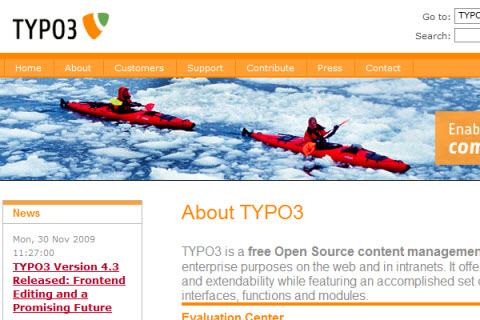
2. Frog CMS
Unlike Typo, Frog CMS is known for its simplicity and speed. It‘s features include on page editing, templating code. It is extendable and includes an API and you can also add images and pages to the data. However, this software is involved and is not recommended for newbies. By using Frog, you can be fully ready with a content solution within an hour. This is also supported by PHP and has RDMS like MySQL or SQLite.
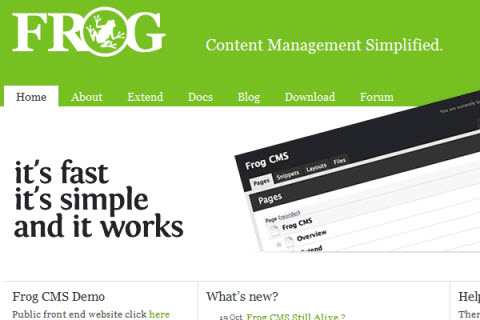
Read the rest of this entry »
Fluidium is an open-source platform for developing Rich Internet Applications that run as native Mac OS X desktop apps. Fluidium is much like Adobe Air, except open source (liberal Apache license), and exclusive to the Mac.
Increasingly, new applications are being written as web apps, but native Cocoa applications still provide the best user experience on Mac OS X. Using Fluidium, you can wrap your existing web app in a pure, native Mac application shell and provide the best of both worlds to your demanding user base.
Fluidium is unabashedly Mac-only, and makes no cross-platform compromises. With the high quality of native Mac apps, cross-platform, least-common denominator approaches don’t cut it on OS X. Your Fluidium-based app will fit right in on OS X as a first-class Cocoa citizen.
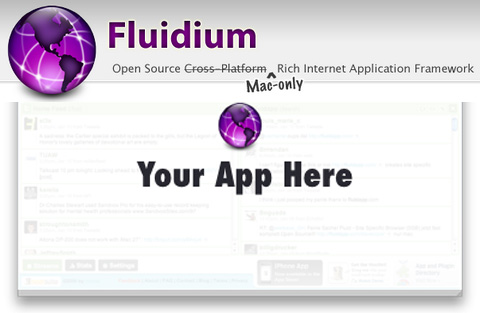
Requirements: Mac OS X
Demo: http://fluidium.org/
License: Apache License
Uki is a fast and simple JavaScript user interface toolkit for desktop-like web applications. It comes with a rich view-component library ranging from Slider to List and SplitPane. Google wave layout can be coded in 100 lines using uki code.
Uki doesn’t want to be a Jack-of-all-trades. It only does layout but it does it well. You won’t find any ajax or data storage layer code here. Uki uses progressive rendering and can render 30k+ lists and tables most instantly. Uki works with IE6+, Opera 9+, FF 2+, Safari 3+, Chrome. And it looks exactly the same in all of them.

Requirements: –
Demo: http://ukijs.org/functional/wave.html
License: MIT License

Ample SDK is a standard-based cross-browser JavaScript GUI Framework for building Rich Internet Applications. It employs XML technologies (such as XUL, SVG or HTML5) for UI layout, CSS for UI style and JavaScript for application logic. It equalizes browsers and brings technologies support to those missing any.
Ample SDK is entirely written in JavaScript and thus it does not require any specific components installed in your browser to operate properly. It doesn’t modify the browser infrastructure but rather fills in the missing functionality.
Ample SDK consists of a Ample Runtime (or Core) and User Interface Markup Language implementations. Ample Runtime implements DOM (Level 3) objects, XML languages, objects facilitating work with XML, XSL-T, and a whole range of UI services. Every UI Markup Language implementation is included separately depending on your needs and specifics of the User Interface you build.
Ample SDK can easily be extended by prototyping existing or new objects. You can also create new components or entire languages that suit best your User Interface specifics.
Ample SDK Runtime is fully functional in all modern web browsers. User Interface languages are still being implemented/tested and some quirks might be observed. Ample SDK is distributed using a dual-licensing approach under MIT and GPL licenses.
Requirements: –
Demo: http://www.amplesdk.com/examples/
License: MIT and GPL License
Ajax.org PlatForm is a pure javascript application development framework aimed at developers for building applications that run via web browsers, but look and feel like conventional desktop applications. These Rich Internet Applications (RIAs) are a combination of the best of both worlds.
Ajax.org PlatForm has the desktop advantages of quick response time—the client handles a majority of the processing load, and generally only a small amount of data must be retrieved from the server (usually from a web service). Furthermore, the data represented on the screen has more density, and does not need to be refreshed— animations and other user cues are possible. Things like drag & drop, right-click menus, property windows, and similar interface items.
They believe Opensource software should be and remain free, and within this context there should be as little limitations as possible for people to utilize the free software. This includes not placing any restrictions on the use of the library in a commercial setting. The LGPL license covers all these requirements.
The Open Source Ajax.org PlatForm offers an innovative new way to develope Internet applications that run on FireFox, Internet Explorer, Opera, and Safari.
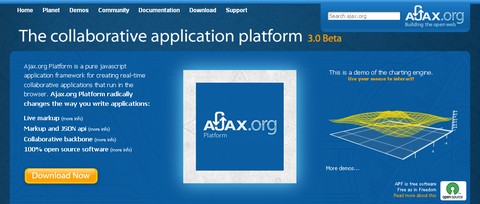
Requirements: –
Demo: http://www.ajax.org/#demos
License: LGPL License

Node.js is an Evented I/O for V8 javascript. Node’s goal is to provide an easy way to build scalable network programs. This is in contrast to today’s more common concurrency model where OS threads are employed.
Thread-based networking is relatively inefficient and very difficult to use. Node.js will show much better memory efficiency under high-loads than systems which allocate 2mb thread stacks for each connection.
Furthermore, users of Node are free from worries of dead-locking the process – there are no locks. Almost no function in Node directly performs I/O, so the process never blocks. Because nothing blocks, less-than-expert programmers are able to develop fast systems.
Node is similar in design to and influenced by systems like Ruby’s Event Machine or Python’s Twisted. Node takes the event model a bit further – it presents the event loop as a language construct instead of as a library.
Requirements: –
Demo: http://nodejs.org/
License: MIT and GPL License
Facebook Connect is way to make your application more social. With it you gain access to: Identity: the user’s name, photo and more. Social Graph: the user’s friends and connections. Distribution: the Stream, and the ability to communicate. Integration: publishers, canvas pages, profile boxes & tabs.
This guide is for using the Mu JavaScript library to access the above on your site. Mu is a very lightweight library which you can use Facebook Connect on your site along with your favourite JavaScript library such as Dojo, jQuery, MooTools, Prototype or YUI.

Requirements: Facebook Connect
Demo: http://mu.daaku.org/console/
License: License Free
CSScaffold is a CSS framework written in PHP. Rather than try and create a static framework that uses the standard abilities of CSS, like Blueprint, it uses PHP to extend CSS. The syntax looks and feels exactly like CSS, except that you have some new, powerful abilities.
The best part is that all of this is done transparently. You can drop Scaffold into your site and you’ll instantly have access to all of its functionality. Scaffold requires a web server with PHP 5+. Mod_rewrite for Apache is required if you want it work automatically route your css files through Scaffold.

Requirements: PHP 5+
Demo: http://github.com/anthonyshort/csscaffold
License: New BSD License
Most of us create identities across the web without much conscious thought. We fill in profiles, upload photos, videos, reviews, and bookmarks. Although this information is often public, it’s fragmented into the silos of individual websites.
Glenn Jones built a JavaScript library that can help you do just that. Ident Engine discovers and retrieves distributed identities and profiles from across the web. Simply enter your profile URLs, you would be shocked by the level of detail it found out about you. You can also find out how Ident Engine works on A List Apart: Discovering Magic as well.

Requirements: –
Demo: http://identengine.com/
License: MIT License














